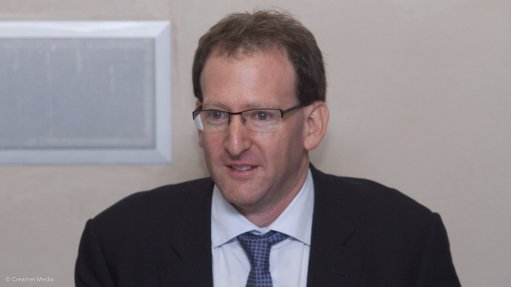
Glencore CFO Steve Kalmin
Photo by: Duane Daws
JOHANNESBURG (miningweekly.com) – Global diversified mining and marketing company Glencore threw its full weight behind complete openness in its maiden Payments-To-Governments Report 2015.
In a 17-page outline, Glencore CFO Steve Kalmin provides an overview of the $5-billion it paid last year to 16 governments ranging from Argentina to Zambia and including South Africa.
Australia received the highest single amount at $866 744 000, more than ten times the $83 500 000 to South Africa.
Disclosing payments made on a country‑by‑country and project‑by‑project basis, the report is aligned to the requirements of Chapter 10 of the European Union’s accounting directive.
“We’re committed to the highest standards of corporate governance and transparency and support increased transparency around the redistribution and reinvestment of such payments,” Kalmin writes in the document of the London-, Hong Kong- and Johannesburg-listed company, which proclaims itself as an active member of the Extractive Industries Transparency Initiative (EITI).
Taxes, royalties, employees’ wages and payments to local suppliers form the elements of the economic and social contribution.
Glencore’s size and long‑term operational make-up mean that it is able to make economic impact in host countries.
“We believe that communities should have access to clear information on how much their governments have earned from the extraction of natural resources,” says Kalmin, who also sees it as vital that citizens can find out how these revenues contribute to the development of their society and their country’s economic status.
Having transparent information about payments to governments also reduces the potential for corruption by all parties.
“Countries that transparently and effectively allocate natural resource wealth for the benefit of their communities have the potential to attract greater, more responsible and longer‑term investment. We strongly support transparency in the redistribution and reinvestment of these payments and are active participants in EITI,” he adds.
Marketing activities form a core component of Glencore’s business model, which in addition to mainly sourcing commodities from third parties, sources product from the company’s industrial operations.
Glencore’s primary marketing and support entities are located in Switzerland, the UK, Netherlands, Singapore and the US, with the pricing of transactions from group companies in countries including Bolivia, Burkino Faso, Canada, Chad, Chile, Colombia, the Democratic Republic of Congo, Equatorial Guinea, Kazakhstan, Namibia, Peru and Tanzania, based on a determination of fair market and arms-length commercial equivalent pricing and terms, Kalmin spells out in the release to Creamer Media’s Mining Weekly Online.